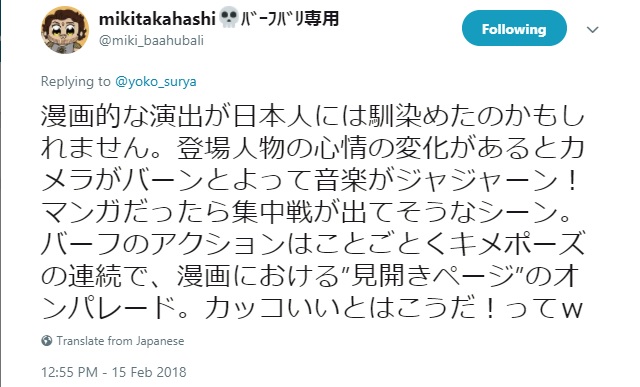*Photo source: Manorama Online
In line with the Indian online media Scroll's request for voluntarily collecting the opinions from the Japanese Baahubali fans (Mahishmatians) over Twitter, it was honorable to me that I too was included in the subjects of the interview.
But first, you may read here the article written by the journalist Devarshi Ghosh, which is the refined, polished and sophisticated result of them and officially published on Scroll.
When Katappa-san killed Baahubali-san: SS Rajamouli’s films are the latest fan favorite in Japan - Scroll
Today, I want to introduce you what I answered his questions, from a common-Japanese-who-lives-in-India-and-observing-the-happenings-in-Japan type of aspect. For your kind information, I do not have a sound knowledge of ancient Indian history, Hindu mythologies, nor religions in India.
Q. When and where did you watch the Baahubali films?
I watched the series last week (10th and 11th Feb.) on Netflix India at my home in Pune.
Q. How and when did you know that Baahubali was becoming famous in Japan?
A few (physical) friends of mine in Japan talked about "1" early last year on their SNS, and I was curious. Then, when "2" was released the last year-end in Japan, I saw not only they (my friends who talked about "1") but also the Twitter community start spreading the reputations, it was like wild-fire gradually spreading, mostly through word of mouth. As you know, now some of the public figures also admire the movie.
Q. Is Baahubali a nation-wide phenomenon in Japan? Or is the popularity in Japan limited to a particular area/province/region?
We can say it the popularity is in whole Japan. You may refer to the link, Baahubali Japan official link that lists all theaters currently showing Baahubali 2.
Q. Please explain the concept of "masala screenings." Are these independent screenings?
Refer to Wikipedia link for Masala Screenings (マサラ上映.) Some theaters in Japan open one of their screens for allowing people to enjoy the show in a free spirit, like shouting out, singing along, throwing confetti, etc. People in Japan believe that that is the default scenes observed in Indian (especially South Indian) movie theaters; thus the term "Masala" comes from. Here, people are asked to clean the theater screen themselves after enjoying the special event (people come with their brooms and dustpans.) Usually, conventional multiplex opens up one of their screens dedicated to this Masala Screening.
Q. What does this hashtag mean? -- #インドにバーフバリ叫ぶ
[Shout out (from Japan) to India (your love for) Baahubali]
Q. Were the titles of the movies changed when they were released in Japan?
I can just write the direct translation of Japanese title here -
Baahubali - The Beginning -> (Japan) Baahubali - The Birth of the Legend (バーフバリ 伝説誕生)
Baahubali - The Conclusion -> (Japan) Baahubali - The Triumphant Return of the King (バーフバリ 王の凱旋)
Q. In your personal opinion (and not the opinions of others), why do you think Baahubali has touched hearts in Japan?
The Baahubali world is very different from that of what we are familiar with in Japan, including the Hinduism, costumes, language, customs, and color concepts, and yet their stories are fundamental and universal; so it could give stronger and more ground-breaking effect on the people in Japan. Many of the Japanese fans on Twitter often refer to the good-looking actors and actresses in Baahubali, and they are getting crazy after their exotic appearances (including machoness and muscles) and charms. It looks like Japanese people who had been familiar with Hollywood stars opened up their eyes to the beauty of South Asian (or South Indian) people.
Q. Lastly, one final translating task. Please tell me what this tweet means:

*Due to some unknown issues, direct copy to tweet was not available
and thus embedding the screenshot image and link to the original tweet.
(Summary): Baahubali world is full of manga-like productions that also added further familiarity to many Japanese people (as Japan is famous for its comic culture.) For example, the main actor's emotional change is expressed with a tactic camera works and music effects, actions of Baahubali are like a series of decisive acts, which are like a series of facing pages. (Note: a pair of facing pages is a method of manga effect, where a significant scene uses facing pages to enlarge the image to maximize the message/impact.)
*Yoko's question, which I expected the journalist-ji to include in the article but was dismissed, in a hope of someone would notice and give me a genuine answer ;)
I want to know if the director S.S. Rajamouli and producers calculated this kind of the charismatic values those casts in Baahubali could gain even in overseas, i.e., if they selected the casts from the viewpoint that they would be deified (as we see Rajinikanth is deified among some people in Tamil Nadu.) The reason why I ask this question is that Rajinikanth is also treated like a God among some of the core fans in Japan since the release of "Muthu" in around 2000. Similarly, some fans of Baahubali start "worshipping" the actors like Prabhas, Anushka Shetty, Rana Daggubati, Ramya Krishnan, Sathyaraj as their Gods.

"Worshipping" Baahubali with our niece on 12th February 2018.
I have not had time to watch Baahubali for the second round since then.